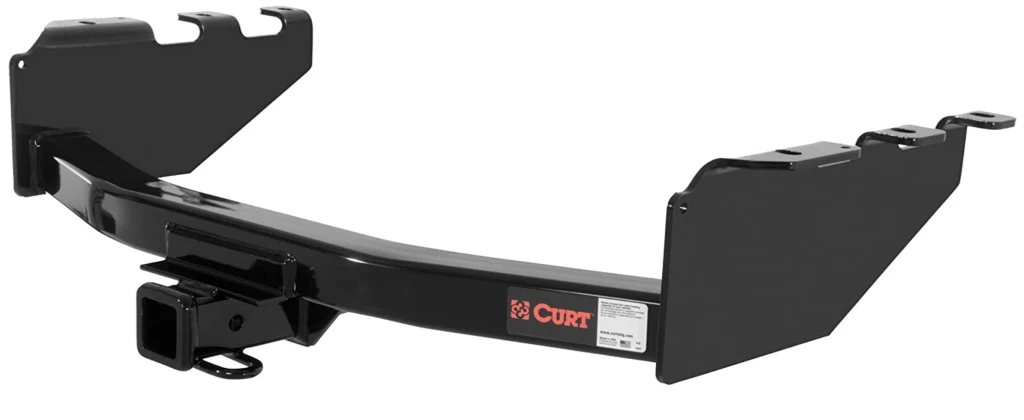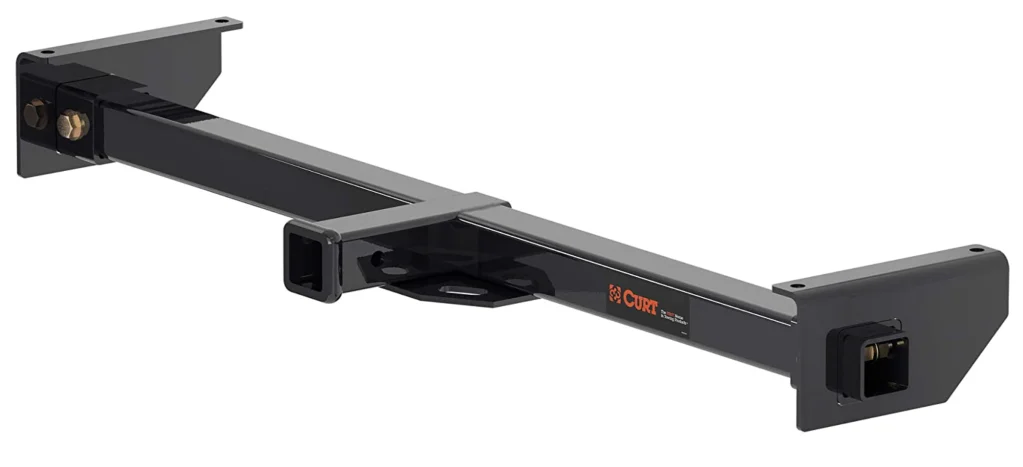Adding a travel trailer receiver to your vehicle opens up a whole new world of possibilities. These simple tools allow you to tow all kinds of cargo, including cargo trailers, campers, and even small items like bikes and pop-up furniture.
The number of receivers on the market is massive. If you’re shopping for a travel trailer receiver, you may already be flustered by the number of options. Luckily, we know a thing or two about these devices and how to choose the right one for your needs.
Ready to learn more? Let’s go!
What is a Travel Trailer Receiver?
What is a travel trailer receiver, anyway? Before deciding whether you can add one for your travel trailer, let’s find out.
A travel trailer receiver, or receiver hitch, is a type of tow hitch. These devices attach to a vehicle’s chassis, allowing the vehicle to pull trailers and other vehicles. What sets the receiver hitch apart from other types is its ability to accommodate–or receive–ball mounts, bike racks, drawbars, and other insertable pieces.
Receiver hitches are one of the most common styles on the market.
What Are the Different Classes of Receiver Hitches?
Not all travel trailer receivers are created equal. Different load capacities require different hitch classes.
Let’s look at the different types of classes and how much weight they can pull.
Class 1 & 2
Hitches in Classes 1 and 2 are intended for small-to-medium cargo loads. A Class 1 pulls up to 2,000 pounds in total trailer weight, while a Class 2 handles up to 3,500 pounds. These come standard with many cars and crossover SUVs. You can also find them on some small pickup trucks.
Class 1 and 2 hitches are perfect for small trailers and campers. You could pull a teardrop trailer, a TAB trailer, or a folding tent camper using one of these devices.

Class 3 & 4
Hitches in Classes 3 and 4 are built for medium-to-large cargo loads. A Class 3 can pull up to 5,000 pounds of total trailer weight, and a Class 4 handles up to 10,000 pounds. You’ll find Class 3 and 4 hitches on vans, mid-size SUVs, and full-size pickup trucks.
A Class 3 accommodates most mini travel trailers and lightweight travel trailers. By contrast, a Class 4 can pull almost any full-size travel trailer.

Class 5
Class 5 hitches are for heavy-duty towing. These powerful add-ons can pull a whopping 18,000 pounds in total trailer weight.
Although most SUVs and full-size trucks come with a Class 4, many RVers and travelers upgrade to a Class 5. This powerful tool can pull almost any trailer on the market.
What Receiver Hitch Component Should You Choose for a Travel Trailer?
Conventional Hitch
Conventional hitches are some of the most common travel trailer receivers. They connect to a vehicle using that vehicle’s built-in tow ball. These types of devices contain receiver tubes that connect to ball mounts and hitch balls.
Most usual towing methods utilize conventional hitches. However, hitch ball sizes vary depending on the size of the trailer being pulled. To avoid accidents, be sure your hitch ball matches your trailer’s needs.
Frame Mounted Hitch
Some vehicles don’t come with tow hitches. That’s where a frame mounted style comes in. These unique travel trailer receivers attach to your vehicle so you can pull whatever you need to.
You can install a frame mounted device yourself or have an RV retailer install it. Some styles allow for a no-drill installation. But be careful: always attach this type of receiver hitch to your vehicle’s frame, not its bumper.

RV Hitch Mount
Like frame mounted hitches, RV hitch mounts are add-on accessories for your towing vehicle. Although they’re frequently confused with each other, these two types of travel trailer receivers are different.
While a frame mounted style attaches to a vehicle’s frame, an RV mount connects at the bumper. This allows you to carry bicycles, folding furniture, and other cargo on the back of your vehicle. These accessories come in bolt-on and clamp-on styles.
Unlike frame mounted and conventional styles, RV mounts aren’t used for towing. Never try to pull a trailer or camper using this receiver hitch.
How to Select a Trailer Hitch
There are tons of different types of travel trailer receivers out there. You may wonder how to choose one that’s right for you.
The type you need will depend on what you want to accomplish or what kind of travel trailer you’re pulling. If you plan to pull a travel trailer, your best bet will be a Class 3, 4, or 5. These styles have the capacity to tow almost any pull-behind camper. But keep in mind that you’ll need a large pickup truck or SUV to pull these heavier items.
If you simply want a little extra RV storage space, consider an RV hitch mount. These devices are convenient and save you the trouble of hauling items that might otherwise need to go in a cargo trailer.
Can You Install a Trailer Hitch Receiver Yourself?
Installing a travel trailer receiver might sound intimidating. But the good news is that it’s a pretty straightforward process. With the right balance of automotive knowledge and DIY spirit, you can install one of these devices yourself.
You’ll probably need to do some prep work before installing the hardware. Depending on your vehicle, you may need to adjust the placement of your exhaust and spare tire storage. But once these tasks are done, you can attach your new connection in under an hour.
One of the most crucial steps is ensuring your hardware is properly attached. This includes double-checking the torque on the attachment bolts. And, of course, you should never attach a hitch that doesn’t align with your vehicle’s towing capacity.
Don’t feel confident in your automotive skills? Just check with your local auto shop or RV retailer. They’ll be able to offer some guidance or even do an installation for you.
Conclusion
The world of travel trailer receivers can be overwhelming. With all the different classes, vehicle requirements, and load capacities, it’s a lot of information!
But thanks to online resources and RV retailers, choosing a travel trailer receiver doesn’t have to be intimidating. Choosing the right style just requires a little knowledge about your towing vehicle and the trailer, camper, or cargo you want to pull. Don’t wait–do a little research, choose your device, and you’ll be ready for any adventure.
Discover the Best Free Camping Across the USA
To be honest with you, we hate paying for camping. There are so many free campsites in America (with complete privacy).
You should give it a try!
As a matter of fact, these free campsites are yours. Every time you pay federal taxes, you’re contributing to these lands.
Become a FREE CAMPING INSIDER and join the 100,000 campers that love to score the best site!
We’ll send you the 50 Best Free Campsites in the USA (one per state). Access the list by submitting your email below: